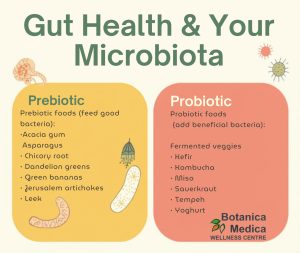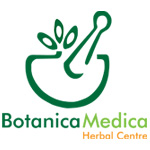
Are you aware that we have ten times more bacteria living within our digestive system than we have cells in our body? These tiny organisms are collectively known as the gastrointestinal microbiota and play a major role in our overall health. Science is only beginning to understand the full extent of how our microbiome influences our immune system, protecting against harmful bacteria and food sensitivities, maintaining intestinal lining and even metabolising certain foods and aiding in the synthesis of essential nutrients like folate (B9) and vitamin K.
For every action, there is an equal and opposite reaction, that is how diet and lifestyle factors impact the homeostasis of the microbiota. Many aspects of our modern diet and lifestyle, unfortunately, have a negative impact on this balance, which can result in dysbiosis. Dysbiosis occurs when the normal diversity and balance of bacteria, microbes and fungi is disturbed. This can result in gut issues like constipation, gas or diarrhoea, or skin issues such as acne, eczema or rashes.. But it doesn’t stop there, you may also experience bleeding gums, tooth decay, fatigue, mood changes and chronic inflammation. Contributing factors to dysbiosis include the use of antibiotics, reflux medications, diet, alcohol, stress and infections. This causes a decrease in good bacteria, an interference with stomach acidity, increased intestinal permeability, and reducing the number of beneficial bacteria that are protective and allowing pathogenic growth of non-favourable bacteria.
But today, I am here to let you know that you can support your health with holistic foundations that look at root causes in client management. This may include probiotic and prebiotic education, nutritional medicine, herbal medicine and lifestyle management to assist in the contributing factors that sustain dysbiosis.
So… what are Probiotics & Prebiotics?
The World Gastroenterology Organisation states that probiotics include a variety of strains, most commonly Lactobacillus and Bifidobacterium genuses, and when administrated in adequate amounts, confer a health benefit on the host (humans). Lactobacillus and Bifidobacterium genuses are two of the most important and beneficial bacteria to the human gut microbiome. Playing a central role in digestion, immunity and maintaining a healthy microbiome balance.
Fortunately, as a Clinical Nutritionist I love to incorporate foods that are naturally occurring probiotic foods, these include:
- Fermented vegetables
- Kefir
- Kombucha
- Miso
- Onion
- Sauerkraut
- Tempeh
- Yoghurt
We can also use naturally prebiotic rich foods to support our gut microbiota balance. Consider prebiotics like a natural fertiliser for the gut, they are fibres and compounds that bypass digestion and reach the colon intact (therefore, not digested or absorbed in the upper digestive tract). This allows the gut microbes to ferment them, producing short-chain fatty acids (including lactic acid, butyric acid, and propionic acid), and these help to nourish the colon, allowing beneficial bacteria to grow, regulate inflammation and strengthen the gut barrier (good bye intestinal permeability).
To date the top prebiotic foods include:
- Acacia gum
- Asparagus
- Chicory root
- Dandelion greens
- Green bananas
- Jerusalem artichokes
- Leek
👉 Supporting your gut means supporting your whole health. Ready to start nourishing your microbiota?
Start nourishing it today with probiotic and prebiotic foods — and if you’d like personalised guidance, book a consult with us at Botanica Medica. Let’s help your microbiome flourish!”
📍 97-99 Glen Osmond Road, Eastwood 📞 08 8271-1827
Written By Amber Frankel
References
Davani-Davari D, Negahdaripour M, Karimzadeh I, Seifan M, Mohkam M, Masoumi SJ, Berenjian A, Ghasemi Y. Prebiotics: Definition, Types, Sources, Mechanisms, and Clinical Applications. Foods. 2019 Mar 9;8(3):92. doi: 10.3390/foods8030092. PMID: 30857316; PMCID: PMC6463098.
Gibson GR, Roberfroid MB. Dietary modulation of the human colonic microbiota: introducing the concept of prebiotics. J Nutr. 1995 Jun;125(6):1401–12.
Hill C, Guarner F, Reid G, Gibson GR, Merenstein DJ, Pot B, et al. Expert consensus document. The International Scientific Association for Probiotics and Prebiotics consensus statement on the scope and appropriate use of the term probiotic. Nat Rev Gastroenterol Hepatol. 2014 Aug;11(8):506–14.
Swanson KS, Gibson GR, Hutkins R, Reimer RA, Reid G, Verbeke K, et al. The International Scientific Association for Probiotics and Prebiotics (ISAPP) consensus statement on the definition and scope of synbiotics. Nat Rev Gastroenterol Hepatol. 2020 Nov;17(11):687– 701.

Recent Comments